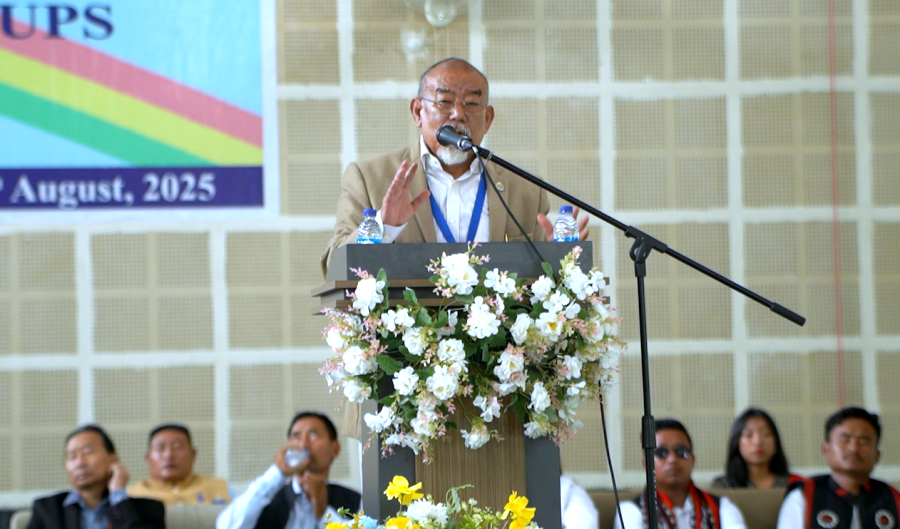THURSDAY, AUGUST 14, 2025
- Home
- Kitovi slams NSCN (IM) over ‘lack of sincerity’
Kitovi slams NSCN (IM) over ‘lack of sincerity’
Kitovi Zhimomi accuses NSCN(IM) of insincerity, urges unity, and calls on youth to demand early Naga political solution.
Published on Aug 14, 2025
Share
Claims Tuccu forced into stand against WC-NNPG, 90% of NSCN (IM) want early solution

DIMAPUR — GPRN/NSCN ato kilonser and WC-NNPG convenor, Kitovi Zhimomi, has alleged that NSCN (IM) leader Q Tuccu might have been compelled to sign the recent statement ruling out collaboration with the NNPGs, despite earlier joint commitments.
Speaking to the media after the 79th Naga Independence Day celebration at the group’s designated camp in Khehoyi on Thursday, Zhimomi said that 16–17 agreements have been signed over the years to foster unity among Naga groups—some by top leaders and others by representatives. Yet, he alleged, the NSCN (IM) had engaged in secret dealings with the government of India, undermining those unity efforts.
He maintained that all past agreements were meant to unite Naga groups and move forward together, which was why the Forum for Naga Reconciliation (FNR) had termed the process the “Journey of Common Hope.”
However, on August 3, 2015, the NSCN (IM) signed the Framework Agreement without consulting other Naga groups, a deal that “failed to materialise.” This prompted the formation of the Working Committee of Naga National Political Groups (WC-NNPG), which negotiated with the government of India and signed the Agreed Position, he said.
Zhimomi recalled that on January 14, 2023, senior NSCN (IM) leaders, including VS Atem, president Q Tuccu, and vice president Tongmeth Konyak, signed a joint declaration with the NNPGs to merge the Agreed Position and the Framework Agreement to expedite an early solution.
Also read: NSCN (IM) reaffirms Naga unity, freedom at 79th Independence Day
However, just four days later, the NSCN (IM) issued a statement nullifying the agreement—an act, Zhimomi said, that showed “a lack of sincerity from the beginning.”
He further shared that during an FNR-organised meeting in Kohima, NSCN (IM) representative Kraibo Chawang admitted it was a mistake not to consult Naga civil societies before signing the Framework Agreement, calling it the group’s “biggest blunder.” FNR convenor Dr. Wati Aier had then remarked that if a leader admits a mistake, there is no reason the Nagas cannot unite—a comment that had sparked public hope.
WATCH MORE:
However, Zhimomi said Tuccu’s August 3 statement rejecting collaboration raised doubts. He questioned whether the NSCN (IM)’s objection was over nomenclature or the exclusion of Manipur and Arunachal from it.
He maintained that there is a written document signed by both delegations and collective leaders, and if the NSCN (IM) refuses to work together, the NNPGs will still continue their efforts. He claimed that “90% of NSCN (IM) members support an early solution” and that only a few seek to delay it.
Warning that the Naga people are heading into a “danger zone,” Zhimomi expressed hope that NSCN (IM) members would eventually speak up and clarify whether Tuccu signed willingly or under compulsion. He predicted a clear divide between “pro-solution” and “anti-solution” factions within the NSCN (IM) soon.
Asked why the NNPGs and NSCN (IM) could not meet together during the visit of government of India representative AK Mishra, Zhimomi said that the NSCN (IM)’s demand for a separate flag and constitution would inevitably lead to disputes in such a meeting. He also suggested Mishra’s frequent visits could involve private consultations with civil society leaders to gauge whether any solution could be smoothly implemented.
Zhimomi pointed out that the Agreed Position is in the public domain with no objections raised so far, while the Framework Agreement has never been made public. He said that the government of India holds both documents and expressed confidence that the Framework Agreement, like the Agreed Position, may also contain provisions beneficial to the Naga people.
He reiterated that if the Framework Agreement proves positive, both agreements should be combined — but alleged the NSCN (IM) now opposes this. He argued that the Agreed Position covers all Nagas, including those in Manipur and Arunachal, while the Framework Agreement would “ultimately benefit only a handful.”
Stressing that the movement belongs to all Nagas, not a single community, Zhimomi questioned why the aspirations of the majority should be held back by a few individuals. He urged Nagas, especially the youth, to “take to the streets and demand their future.”

